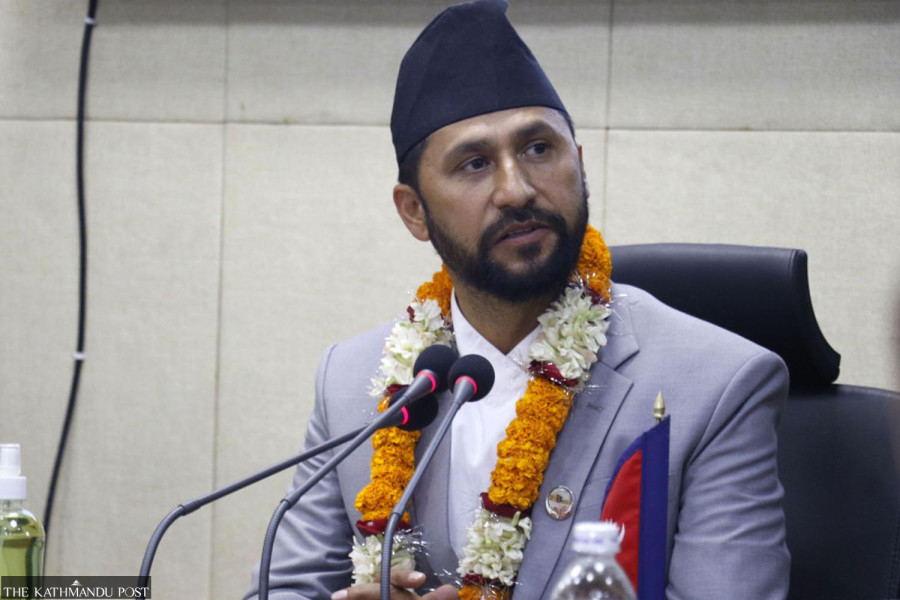Politics
Rabi Lamichhane says court cannot examine Attorney General’s decision
The writ petitioner Yubaraj Poudel, however, claims the attorney general’s powers as stipulated by Article 158(2) does not apply in Lamichhane’s case.
Tika R Pradhan
The Rastriya Swatantra Party chair Rabi Lamichhane has said the court cannot question the Office of the Attorney General’s decision not to take forward his passport case in the court.
Lamichhane has claimed that the attorney general has taken a judicious decision on his passport case by following due process as per the constitutional provision and that the decision cannot be questioned and therefore should be deemed appropriate. The Attorney General had earlier decided not to pursue the passport case against Lamichhane, who is accused of acquiring a Nepali passport through an invalid citizenship certificate.
“This is the constitutional right of the attorney general and the decision will be final,” states the written statement Lamichhane submitted to the Supreme Court. “No one has the right to question the judicious decision taken by the attorney general.”
The statement submitted by advocate Mohammad Aftab Alam on behalf of Lamichhane quotes Article 158(2) of the constitution that states the attorney general has the authority to decide whether or not to take the case to court on behalf of the government.
Article 158(2) of the constitution states that except as provided otherwise in this Constitution, the Attorney General shall have the right to make a final decision as to whether or not to institute any case on behalf of the Government of Nepal in any court, judicial institution or authority.
However, the writ petitioner Yubaraj Poudel claimed that the attorney general’s authority as stipulated by Article 158(2) cannot be used in the case of Lamichhane because everything is crystal clear including the evidence of his crime and he has already admitted to it.
“The article can only be used when the case will have an adverse effect on the person who is actually innocent,” said Poudel. “But in this case, Lamichhane has already admitted that he had acquired the passport using his fake citizenship certificate, which is a crime.”
Attorney General Dinmani Pokhrel decided not to move ahead with the case against Lamichhane on March 20 despite the former deputy prime minister and Home minister already admitting at the court that he had acquired a Nepali passport while also having American citizenship and passport.
Political analysts and observers, however, have questioned the government for making Lamichhane’s case a bargaining tool to ensure RSP’s support to the government.
After Attorney General Pokhrel announced that the office of the attorney general would not pursue the case, RSP voted in favour of Prime Minister Pushpa Kamal Dahal when he sought a vote of confidence on March 20 for the second time.
But after public criticism, Pokhrel claimed that the announcement was a regular process and was not intended for any kind of bargaining ploy.
Challenging Pokhrel’s decision not to forward the case, Poudel, who had earlier registered a case against Lamichhane’s citizenship certificate, knocked on the door of the Supreme Court in the first week of April.
On April 5, a single bench of Justice Hari Phuyal issued a show cause order—not an interim order as demanded by the writ petitioner—to Lamichhane and other defendants asking them to submit their written response within 15 days.
In his petition, Poudel has made the Department of Immigration and Office of the Attorney General defendants among others besides Lamichhane.
The writ petitioner has argued that the attorney general exceeded his jurisdiction when he decided not to file a case against Lamichhane and therefore Pokhrel’s action was arbitrary and malicious, which obstructed the delivery of justice.
However, Attorney General Pokhrel said he had taken the decision following due legal process and that his office would have to continue with the prosecution if the Supreme Court decides so.
Although Lamichhane claimed he had not used the disputed Nepali passport, the writ petitioner Poudel claims that the TV anchor-turned-politician had misused the passport several times.
“Though I acquired the Nepali passport when I was a foreign citizen, I had not travelled abroad using it and had not done anything with an intention or objective to commit a crime related to the passport,” Lamichhane has said in his written response to the Supreme Court.
However, Poudel has claimed that Lamichhane travelled to different countries including Australia, South Korea and the UAE using the same passport, the evidence of which can also be seen on his social media.
It was Poudel’s writ petition that led to the scrapping of Lamichhane's Nepali citizenship which cost him his deputy prime minister and home ministerial berth as he lost his lawmaker position. Lamichhane was re-elected as lawmaker from the same constituency in a bypoll last month.
Some legal experts have said the decision of the attorney general is final and binding because that is the privilege of the government.
“Nolle prosequi—termination of a legal proceeding by the attorney general—is an established principle followed by countries that follow the common law system,” said Balaram KC, former Justice of the Supreme Court. “But the Supreme Court also has extraordinary jurisdiction and its decision cannot be questioned.”




 8.22°C Kathmandu
8.22°C Kathmandu















